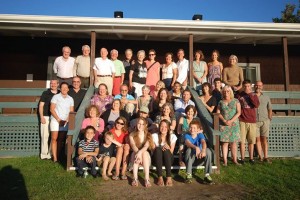“I am who I am”
God to Moses in Exodus 3:14
Thomas asked me to say a little bit about Jewish life in Czechoslovakia in the seventeenth and eigtheenth centuries, and though I know almost nothing about the subject, I was able to find out a few interesting things. Our ancestors lived a life then that was very much like our images of the Eastern European shtetl, albeit less romantic than the Fiddler on the Roof. They were restricted as to where they lived, they paid extra taxes, spoke Yiddish, had no secular education, were limited in the professions they could follow, and were under the tyranny/loving care (depending on your perspective) of their rabbis who were both religious and social leaders.
I had always believed this changed with the emancipation of the Jews under Emperor Joseph and the internal Jewish Enlightenment that was a consequence of the broader European Enlightenment. At this time, there began a process of Germanization of the Jews of Bohemia. They were allowed to join the army, they were required to take German last names, and became part of a secular, German educational system.
But until 1848, Czech Jews were not permitted to live anywhere but a few restricted towns, and only the eldest son was permitted to marry, in a move designed to reduce the number of Jewish families in Bohemia. Only after this date did these things change and over the next fifty years, the lifetime of Leopold Pick, our family went from being something none of us could recognize to the people we know and knew: industrialists, forward-looking, risk-taking, embracing modernity and technology and science, internationalists, and embracing both Czech and German culture. Jews moved into German-speaking areas of Bohemia, and took on German culture, and later Czech culture, when the country of Czechoslovakia was founded out of the rubble of 1918. (Though as an older woman at a lecture once told me, “You know, the only people ever to call themselves Czechoslovakians were the Jews.”) Ruzena Bondy’s prayerbook, written in German with some Hebrew, but with her own writing in Czech shows how she moved between three cultures.
Our name shows traces of these three cultures. Early on it was written Pik (Czech). We know it as Pick (German). Jan told Thomas a story that it comes from a Latin acronym: Peregrinus Iudeae Confessionis (with the K added for pronunciation). This means, “Traveller/Wanderer of the Jewish Faith” — figuratively perhaps, the Wandering Jew. It matters less what its “true” etymology was than what his story says about himself, how he saw himself, and what he taught his sons about who they were. Under the Czech/German sound of the name, there remains a sense of being always Jewish.
Thomas also told me a story about Edmund Pick owning orange groves in Jaffa. In Israel in 2011, I had a chance to do some digging on the Israeli site dedicated to the restitution of Holocaust property, and I discovered Edmund had bought a share or shares in the Jewish Colonial Trust, set up to promote Zionism. With his right hand, he was starting a factory in Czechoslovakia; with the left he was investing in a Jewish state. In a very real sense, Edmund and then Jan knew they were Jewish and this knowledge enabled Jan to save his immediate family. The “Peregrinus” in his name reminded him that his destiny did not have to be in Bohemia.
Our ancestors were Jewish and Czech and German, and we too are products of all the cultures and traditions and strains that have influenced us, the people who raised us, and where we have been since. We are from Canada, Britain, Argentina, the United States, and the Czech Republic. We are Jews and Catholics and Protestants and atheists. We speak English, French, Spanish, and Dutch. We are not half anything or a quarter anything. We live freely and we don’t need Adolf Hitler or a bureaucrat in a government office or a rabbi in a black hat to tell us who we are. We are all of us who we are.

